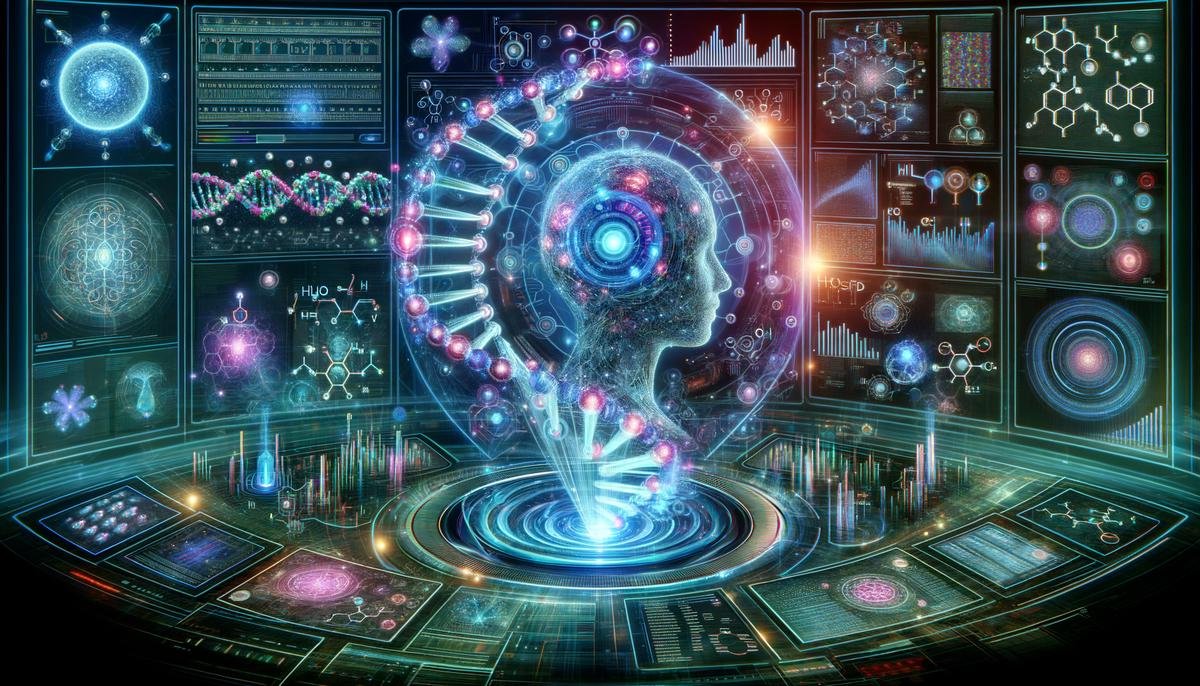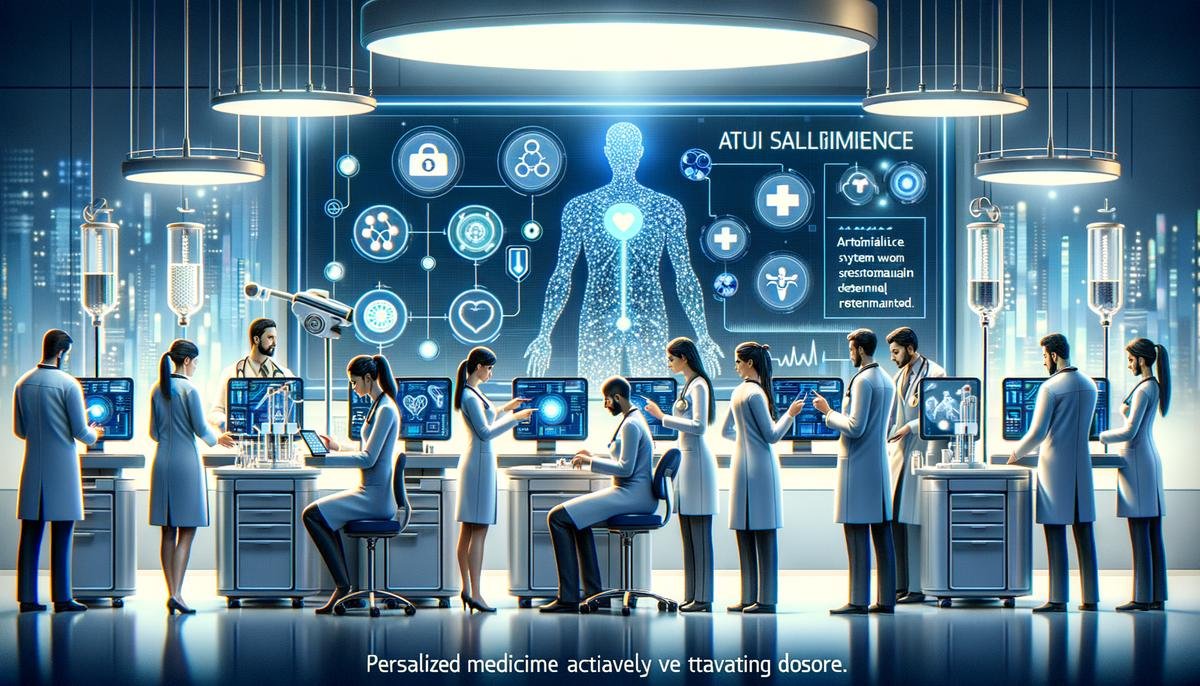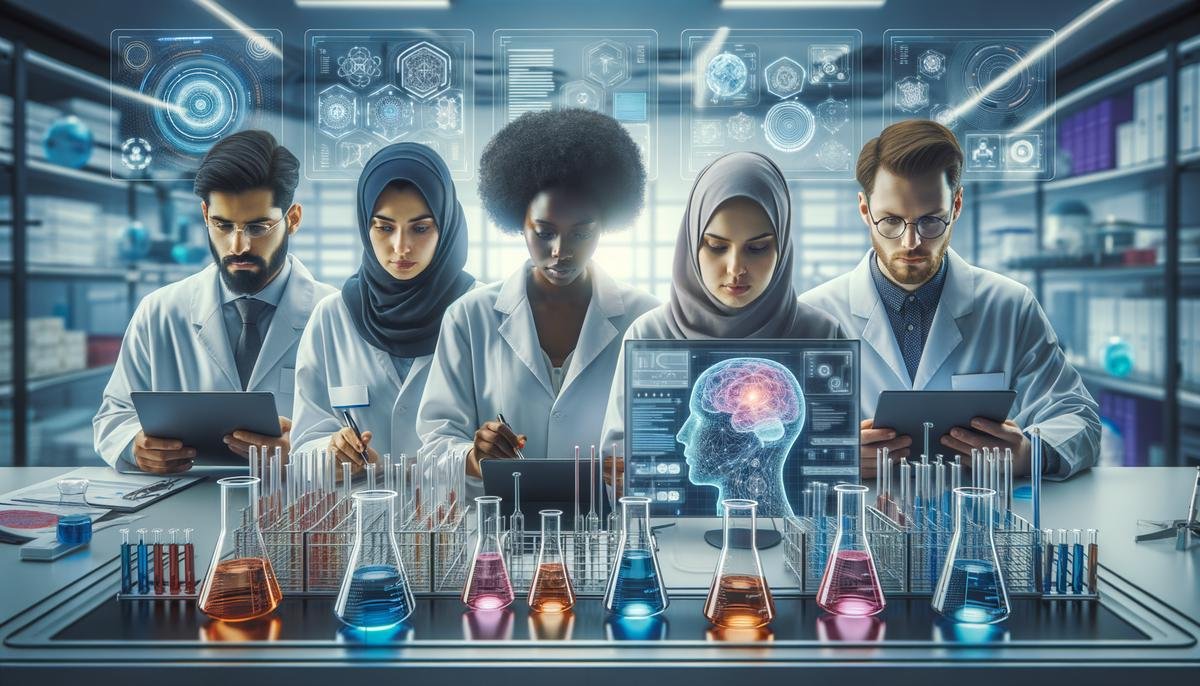Artificial Intelligence (AI) is swiftly transforming the landscape of healthcare, promising unprecedented advancements in how we discover drugs, diagnose diseases, and tailor treatments to individual needs. This exploration into the realms of drug discovery, genomic medicine, medical imaging, and diagnostic processes, alongside the ethical and regulatory challenges, underscores the profound impact AI is poised to have on our approach to healthcare and medicine. As we delve into these critical areas, the promise of AI in enhancing patient care and treatment outcomes shines brightly, marking a significant leap forward in the continuous endeavor to improve human health.
AI in Drug Discovery and Development
AI Revolutionizes Drug Discovery Speed
Artificial Intelligence (AI) is changing how scientists discover new drugs, making the process faster than ever. Traditionally, finding a new drug could take over a decade and cost billions of dollars. However, AI technologies are cutting down both the time and cost significantly.
One major way AI speeds up drug discovery is through its ability to analyze vast amounts of data quickly. Scientists feed AI systems data from previous research, medical records, and genetic information. The AI then identifies patterns and connections that might take humans years to see. This capability not only highlights potential drug candidates faster but also suggests how they might be designed.
AI also plays a crucial role in predicting how different molecules will behave and interact with the human body. This process, known as molecular docking, used to be a lengthy and uncertain task. With AI, researchers can simulate millions of molecule interactions in a short amount of time, pinpointing those with the most promise for development into safe and effective drugs.
Moreover, AI helps in enhancing the accuracy of pre-clinical trials. By analyzing past trial data, it can predict potential side effects and effectiveness of a drug candidate, reducing the risk of failure in human trials. This capability is crucial because advancing a drug that’s likely to fail is costly and time-consuming.
Another area where AI is making a difference is in repurposing existing drugs for new diseases. This approach is particularly beneficial during urgent health crises, such as the COVID-19 pandemic. AI platforms were used to quickly sift through existing medications that could be effective against the virus, speeding up the search for treatments.
Despite these advances, AI in drug discovery is not without challenges. Questions about data privacy, the need for high-quality data, and the integration of AI into traditional research and development processes are significant hurdles.
In conclusion, AI is revolutionizing the pace of drug discovery by analyzing data faster, predicting molecule interactions, improving trial accuracy, and repurposing existing drugs. This advancement means new medications could reach patients quicker, potentially saving more lives in the process.

AI and Genomic Medicine
While the previous portions of the article have highlighted how artificial intelligence (AI) is transforming the process of drug discovery, it’s important to delve into another critical area where AI is making waves: personalized medicine. The advancement of personalized medicine is a significant leap towards more tailored healthcare, effectively moving past the “one size fits all” approach. This is where AI steps in, playing a pivotal role in pushing the boundaries of what’s possible in customized patient care.
AI’s involvement in personalized medicine primarily centers on its ability to process and interpret complex biological data at an unprecedented scale. For instance, each person’s genetic makeup is unique, holding the key to understanding how they might respond to specific treatments or medications. AI algorithms can sift through genetic information from thousands of individuals, identifying patterns and connections that would be impossible for humans to find on their own. This ability not only helps in predicting how different patients might react to the same drug but also in identifying potential genetic markers of disease susceptibility.
Furthermore, AI technologies are fundamental in the advancement of precision oncology, an approach that tailors cancer treatment to the individual characteristics of each patient’s tumor. By analyzing vast datasets of cancer cell genomics and patient outcomes, AI models can predict which treatments will be most effective for specific cancer types. This tailor-made approach can significantly improve treatment effectiveness and minimize side effects, enhancing the quality of life for patients undergoing treatment.
In the realm of chronic disease management, AI’s role in personalized medicine shines brightly. Chronic diseases like diabetes and heart disease often require long-term management strategies that are unique to each patient’s condition and lifestyle. AI-powered tools can analyze data from wearable devices, electronic health records, and other sources to offer personalized recommendations on diet, exercise, and medication management. This not only helps in better disease control but also empowers patients to play an active role in their healthcare.
Despite its potential, the integration of AI into personalized medicine is not without challenges. Issues such as data privacy, algorithmic bias, and the need for significant computational resources pose obstacles that need addressing. However, the ongoing advancements in AI technology and data security are promising signs that these challenges can be overcome, paving the way for a more personalized and effective healthcare system.
As AI continues to evolve, its impact on personalized medicine is expected to grow, offering hope for treatments that are as unique as the individuals receiving them. From unraveling genetic codes to making chronic disease management more personal, AI stands at the forefront of a healthcare revolution, making personalized medicine not just a possibility but a reality.

AI in Medical Imaging and Diagnostics
Artificial Intelligence (AI) is revolutionizing the field of medical imaging, boosting both accuracy and efficiency in remarkable ways. As healthcare continues to advance, the integration of AI into medical imaging stands out as a transformative development. This leap forward not only enhances diagnostic precision but also streamlines the workflow for healthcare professionals, making it a pivotal aspect of modern medicine.
At the core of AI’s impact on medical imaging is its unparalleled ability to interpret complex imagery. Traditional imaging techniques, while effective, rely heavily on the expertise of radiologists to analyze and diagnose based on the images produced. AI algorithms, however, can sift through thousands of images at a speed unattainable by humans, identifying patterns and anomalies with a high degree of accuracy. This capability is not just about speed; it’s about the nuanced understanding of images that might elude even seasoned professionals. Diseases that present subtly on scans can be detected early by AI, leading to timely interventions.
Moreover, AI’s role in enhancing the efficiency of medical imaging processes cannot be overstated. By automating routine tasks, AI allows radiologists to focus on more complex cases and patient care, rather than getting bogged down by the sheer volume of image analysis traditionally required. This is particularly vital in emergency situations where time is of the essence, and rapid diagnosis can significantly affect outcomes.
One of the standout applications of AI in medical imaging is in the field of radiomics, where the technology extracts large amounts of quantitative data from medical images. This data-driven approach provides deeper insights into patient conditions, enabling personalized treatment plans. By analyzing the texture, shape, and size of tumors from images, AI can predict disease progression and response to treatment, a boon for oncology, where such precision is critical.
The integration of AI in medical imaging also addresses the challenge of inconsistencies in diagnosis. Even among experienced radiologists, interpretations of images can vary, leading to differences in diagnosis and treatment plans. AI algorithms, trained on vast datasets, provide a consistent standard for image analysis, reducing variability and improving the reliability of diagnoses across the board.
Despite these significant advancements, the integration of AI into medical imaging is not without its challenges. Concerns about data privacy, the need for extensive training datasets, and the imperative to ensure AI systems complement rather than replace human expertise are ongoing. However, the collaborative potential between AI and healthcare professionals promises a future where medical imaging is more accurate, efficient, and tailored to individual patient needs.
In essence, AI is reshaping the landscape of medical imaging by harnessing the power of machine learning and vast data analysis. This synergy not only accelerates the diagnostic process but also elevates the standard of care, offering hope for earlier detection, more accurate diagnoses, and ultimately, improved patient outcomes. As AI technology continues to evolve and integrate into the healthcare industry, its role in medical imaging reaffirms the potential for smarter, more efficient, and patient-centered medical care.

Ethical and Regulatory Considerations
As artificial intelligence (AI) continues to revolutionize the healthcare industry, its implementation in medical research raises several ethical dilemmas and regulatory challenges that cannot be overlooked. While the potential of AI to transform healthcare is immense, understanding and navigating these ethical and regulatory landscapes are critical to ensuring that AI contributes positively and responsibly to medical advancements.
One of the primary ethical dilemmas involves patient data privacy and security. AI algorithms require access to vast amounts of personal and medical data to learn and make accurate predictions. This exposes sensitive information to potential breaches, risking patient confidentiality. There’s also the question of consent: how do researchers ensure that patients fully understand and agree to their data being used in this way, especially considering the complexity of AI systems?
Bias in AI algorithms presents another significant ethical concern. If the data used to train these algorithms are not representative of the entire population, the technology could develop biases. This can lead to disparities in the quality of care and outcomes for underrepresented groups. Ensuring that AI systems are fair and equitable is a challenge that researchers and developers must diligently address.
From a regulatory standpoint, the rapidly evolving nature of AI poses a major challenge for policymakers. Current regulations may not adequately cover the new scenarios brought about by AI in medical research. For example, determining the liability in the case of misdiagnosis or errors made by AI is complex. Is it the developers, the healthcare providers, or the technology itself at fault? Establishing clear guidelines and updating regulations to keep pace with AI advancements is critical.
Furthermore, the lack of standardized protocols for the development, validation, and implementation of AI in medical research complicates regulatory approval processes. This inconsistency can slow down the adoption of potentially life-saving innovations. Regulatory bodies face the task of creating frameworks that ensure the safety and effectiveness of AI applications while also fostering innovation.
As AI continues to make its mark on medical research, tackling these ethical dilemmas and regulatory challenges head-on is paramount. Stakeholders including researchers, ethicists, policymakers, and patients must collaborate to navigate these complex issues. Ensuring transparency, fairness, and the protection of patient rights while embracing the transformative potential of AI in healthcare will be key to its successful and responsible integration. Balancing the promise of AI with the ethical and regulatory imperatives it presents is not just a matter of compliance but a moral obligation to future generations.

The integration of Artificial Intelligence into the healthcare sector represents a monumental shift, offering tools that are more accurate, efficient, and tailored to meet the diverse needs of patients worldwide. As we grapple with the ethical and regulatory challenges that accompany these advancements, the collective goal remains clear: to harness the power of AI responsibly, ensuring that it serves as a beacon of hope and a catalyst for innovative solutions in the face of global health challenges. With thoughtful consideration and strategic implementation, AI has the potential to not only revolutionize healthcare but also to foster a future where medical care is more personalized, accessible, and effective for everyone.



